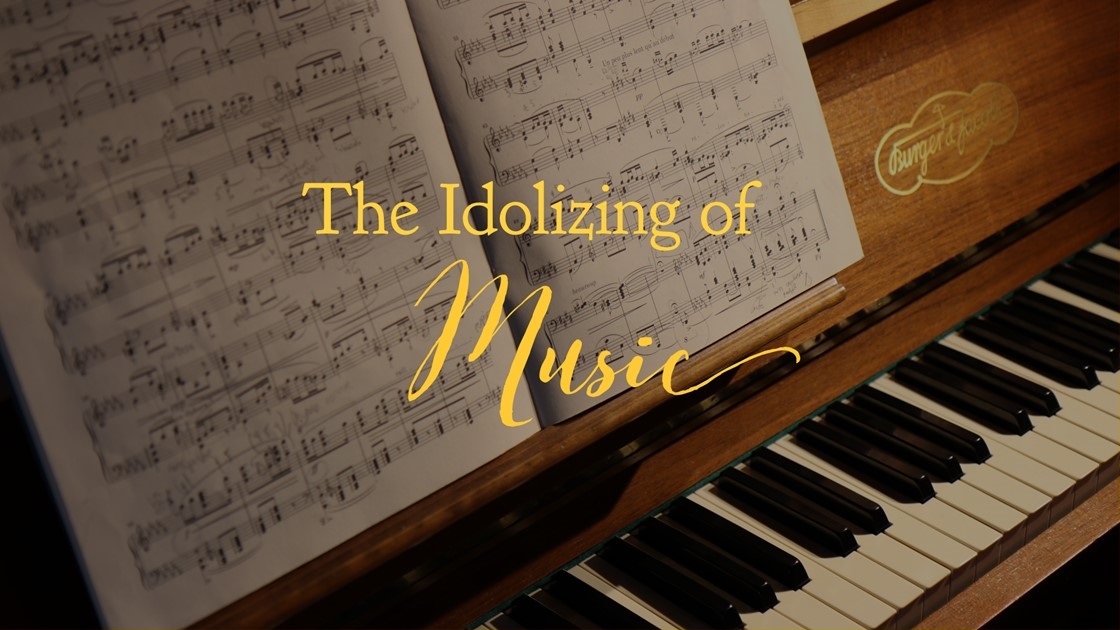Over the years and again recently, I have become aware of some who make music the litmus test of fellowship. What I have observed does not target extreme differences, for those who have embraced musical extremes typically do not remain close enough to warrant talk of separation. Rather, it involves debatable matters. Yet for some, their view of music is held as a fundamental of the faith, and their moving beyond biblical proportion is divisive. If it is overkill (which I believe it is), it fits in the category of carnality—the divisive carnality condemned in the third chapter of First Corinthians. Strange it is . . . using carnality to fight perceived carnality.
This music litmus test is an over-prioritization of music. For many, it is assumes a one-style-of-music-only position. And any time we say “only” where God hasn’t, we are setting up an idol of our own making. This applies to many of the “only” positions that extend beyond the clarity of the written Word. Usually, such positions are three or four steps removed from explicit statements of Scripture, and when one gets that many steps away from the explicit words of God, flesh-dependence is likely as one is forced to rely on personal deductions. While it is fair to grapple, deduce and make personal applications, it is not fair to make a universal standard from conclusions drawn at this level. Personally, I enjoy a variety of music and especially an adagio classical sound, but this is not by any means the only legitimate musical style.
God created music. Satan degrades music (Is. 14:11-12). Therefore, not all music holds the same value. We need discernment in musical choices, but we can go beyond what God has made clear and become rigid where God is not. While each of us must live by our personal convictions, making a universal standard out of a personal application threatens to eclipse God’s personalized leadership in the lives of others. This is not to say that anything goes. God has a “box”—but it is larger than what some may think.
In Christian music, the music carries words of biblical principle. Music is therefore important. It is not unimportant. But it is less important than other, greater matters.
Jesus spoke of the greatest commandments and of the least commandments. In doing so, He made a distinction. While “least” does not imply unimportant (and we should never act like it does), it does imply less important. The greatest commandments (loving God and loving people; caring for them instead of mistreating them) are more important than lesser matters. To not recognize this distinction leads some to run roughshod over people over lesser matters while supposing the issue in question to be of greater importance.
For some, man’s traditions have also been lumped in with the least commandments. This is worrisome because mere traditions are not on the level of the least commandments. And in a setting where the least are deemed to carry the same weight as the greatest commandments, things really get messed up when traditions are accorded the same consideration.
People have been mistreated and slandered over traditions and, specifically, music. Many have been unfairly branded with the C of “compromiser”—the scarlet letter in Fundamentalism. It is not unheard of that one so stigmatized would become the subject of a virtual feeding frenzy of criticism and be eaten alive by adherents of “proper, biblical standards.” But in the Bible, the only group that matches such a piranha-like description is the Pharisees. Some have spoken as if they were knowledgeable on music issues. But often this “knowledge” is courtesy of a ministry-of-criticism paper and not derived from a primary source. Too many times, I have found criticism papers to be inaccurate propagators of assumptions and misinformation, especially regarding motives. Though seeking out a primary source would serve well to validate or contradict the claims being made, it’s a step too often neglected in favor of pointing a finger while thanking God that one is not as other men are (Luke 18:11).
Assigning greater importance to music than God does is the idolizing of music. Why? Because musical applications are not on the level of the indisputable fundamentals of the faith. And much of the division we’ve witnessed is not over an acceptance of flagrant styles of music but, instead, concerns elements that can be debated among those who love the Lord. But breaking fellowship over music that God-loving people view differently—is this really honoring to God?
Is it really Christ-honoring to cut off missionary support over debate-worthy music styles? The issue at hand is not something like embracing heavy metal, not even close. Yet there are missionaries that have been defunded due to music. Should missionaries be expected to subscribe to the position held by every supporting church on every debatable issue? While some might think this would be nice, it would soon prove impossible when support is offered by any more than a single church. Where God has not defined things, there will be differences among Christians and between churches. Is it Christ-honoring to break fellowship with other churches just because, in the grand scheme of things, their conservative music is not as conservative as someone else’s choice?
Sure, we must each apply what we believe in our personal life. But we must let others do the same. Let each one be persuaded (Rom. 14:5). Also, each church must apply what they believe in their own church. But they should let other churches do the same. For Baptists reading this, remember that soul liberty and local church autonomy are “Baptist distinctives.” Deny either of these, whether in principle or practice, and one falls short of being a true Baptist. Thus, it is strange when considering the present matter how that some who have spoken the loudest about being Baptist have proven not to be true Baptists at all. Their actions in the idolization of music reveal what they hold true regarding soul liberty and local church autonomy. Additionally, it is divisively carnal to separate over matters in which each individual and each church has a responsibility to obey the Holy Spirit.
Carnal separation. I must admit, I’ve been there.
In the early years of my ministry, when I was exposed to a good song from a realm of believers that I considered less than my own (this alone was arrogant), I remember saying things like, “Why take a good song out of the garbage?” But when God graciously put me on a revival journey, the Spirit showed me how grossly arrogant this thinking was. I callously referred to children of God as “garbage” only because they differed with me, and I am ashamed of such condescending remarks. Arrogance is wrong.
Sadly, in those early years of ministry, I had fallen into over-prioritizing music. But then I started traveling in evangelism. Travel can help prevent tunnel vision and the onset of living-in-a-bubble theology. I saw believers who loved God, having evidence of the joy of the Lord and effective ministry, who used music different from the music I would employ. I had to decide what was more important—the truth I wake up to preach (like life in the Spirit) or separating myself unto a particular style of music. I decided the more important matters needed to be given priority over less important matters.
Someone might deify a particular style of music and demonize everything else, but this is a fear approach, not a faith approach. It is a one-size-fits-all (or better, my-size-fits-all) attitude toward music that condemns all but one’s own approach and inevitably condemns the innocent. But remember, Jesus condemned those who condemned the innocent (Matt. 12:1ff). Years ago, we wrote a song entitled Help Me Win the Lost. It was written out of burden as the Lord stirred me about the needs of the souls of men. I was burdened that it touch hearts, not just minds. God made music to stir a variety of emotions based on truth, as observed in the Psalms. That was the burden behind the making of the song, and many have testified that God stirred their hearts with this particular song. If this is so, to God be the glory. To my surprise though, a very few considered it offensive. In their way of thinking, it was too emotional, and they condemned it as being wrong. To not prefer the song is fine, but to call good evil is not.
Regarding music, everyone must apply what the Spirit individually persuades them to apply and must allow other believers to do the same. It is fair to seek to persuade others for what you think is best, but it is not fair to idolize music and make it the litmus test of fellowship. For those who have unwisely broken fellowship and yet, down deep, respect God more than they fear the stern faces in their group, the overkill needs to be humbly admitted and appropriate apologies offered.
“Little children, keep yourselves from idols” (1 John 5:21).

John Van Gelderen
Post Author












A hearty Amen to your article! It’s grievous to see the sectarian division this had caused between godly brethren and good churches.
Unwarranted separation between the children must grieve the Father. Thanks Don!
COULD IT BE THAT I IDOLIZED WOMEN AND MUSIC AND LOST TRACK FOR THE WILL OF GOD FOR ME WHEN I WAS @ B.J.U.?WHERE DO YOU STAND CONCERNING SOUTHERN GOSPLE MUSIC?CAN WE TALK?HOW ABOUT SENDING YOU A SINGING NEWS MAGAZINE?3466648849.
It’s possible…
John – Thank you so much for this article. I am amazed and blessed how our spiritual journeys are taking remarkably similar paths. I have been working through many of these same issues and as you say, God’s Word gives very few specific statements regarding music. Recently, I watched a documentary about the current force of Christian music in America and in the marketplace. This documentary traced the movement toward the contemporary sound back to the Jesus movement. These “hippies” truly found Jesus, and they wanted to express their joy in the Lord and give testimony of what God had… Read more »
Good thoughts – thanks Rod!
With respect, Dr. Van Gelderen, because you have been used greatly by God in my life. Your sound, Biblical preaching has helped me in many ways. But I am concerned with where this is going. I agree that there are those who take too narrow a view of music standards and condemn too harshly those using truly conservative Christian music, such as Majesty music (just one example). Yet when I first read your article, I too thought it was unduly vague and could lead those who are legitimately compromising to take it as an endorsement. That seems to be validated… Read more »
I had included a link which included samples of songs from the Jesus Movement era, but it was removed due to this blog’s policy. Samples of that music can be easily found on youtube.
Thank you, Darren, for weighing in, and your tone is appreciated. Your example of Majesty Music is exactly the kind of thing this article is talking about. As I have stated, what I’m addressing is among the conservatives. The reason I have been vague is to protect the guilty. I could name the pastors that I believe are overreaching. I could name the songs that are bring unfairly condemned, and so forth. But as in the conflict and interchange between John Wesley and George Whitefield, I have sought to make this principial, not personal. I have no personal vendetta against… Read more »
This fits so closely with my evolving, deepening understanding of our liberty in Christ! Thank you for articulating these truths in such a practical, helpful way. I always appreciate your writings.
Thanks Jim, many of us are on similar journeys.
Thanks for your comments on this! The Holy Spirit has an objective opinion on music. He will lead us to the right application as we walk with him in sincere love.
It really does come to a trust in the Holy Spirit to lead in the areas that are not spelled out black and white. Thanks Will!
Thank you brother. I appreciate your heart
I had the same tunnel vision for many years. I found there were fine, godly people who did not necessarily on the same page as I am. I found I was stiffling the grace of God and the fruit of the Spirit. Thank you for your good words.
Thanks for this personal testimony!
Well spoken will take me some time to Digest, one thing for sure traveling around the country last year did open my eyes
Thanks John! Traveling does help give perspective.
Amen! So good!
I have considered that worship is our sacrifice of praise for the Lord (Heb 13:14). If it is for God, we must ask what HIS preference is?
According to John 4:23-24, He prioritizes source (spirit and truth) – not style.
John, I would be interested to hear more about what worship in spirit and truth looks like.
Thank you
God’s preference–well said. Thanks Irene! Good thoughts to consider.
Good thoughts brother. Love you and miss you.
Thanks for the encouragement, Bob, and great to hear from you!
Yes, we often are guilty of being in our bubble too much! Different doesn’t always mean wrong. Good thoughts here.
Thanks Mandy, it’s important to realize not all that is different is necessarily wrong.
Dr John, Discussions about music always seem to generate the most inquiry thus showing that it truly is an important issue. While, I understand what you are saying in the article, I do feel the article unintentionally opens up other doors or potential problems. I have a number of thoughts going through my head, but one thing I would say is that when it comes to music, the only people who pretend a lot of musical elements are neutral are Christians. The pop and rock singers of the world tell us exactly why they do what they do. They have… Read more »
Thanks Paul for your thoughts. The article does not argue for the neutrality of music. In fact, the paragraph about Satan degrading music argues otherwise. Regarding missionaries being ethical, that would be true if we are talking about a fragrant shift. But that is not what I am addressing, which I believe I have made clear. I’m addressing different degrees on the conservative side of the spectrum. The problem of saying only where God does not. Condemning everything but one’s own position is a fear approach, not a faith approach. This encroaches on the personalized leadership of the Spirit in… Read more »
flagrant, not fragrant 🙂
I don’t think sinful worldiness is what the author is speaking of. One example I was thinking of while reading it is the guitar. Our previous pastor like classical (so do I) with violins and cellos. But that is all he would allow. The guitar was not allowed. Which is fine, it’s his church. My husband was sent to start a church and we had a couple visit who was from the author’s college. We played the guitar for a special. I’m not great and do basic up and down strumming and not crazy …it’s an acoustic and not hooked… Read more »
Great example! Thanks Shelby.
A much-needed article, Bro. John, thank you for the thought & effort in putting it out there. Coming to Biblically-informed, Spirit-led personal convictions about music is important, but enforcing those convictions on another brother is unbiblical. What compounds this scenario is that, most often, the “enforcing brother’s” convictions are more peer-led and fear-led than they even realise. Wrenching phrases from Scripture as “proof texts” and casting doubt upon other brothers’ testimony often follows – both grave sins. They “strain at a gnat and swallow a camel,” wreaking Satan’s work of division & discouragement in God’s family. May God deliver us… Read more »
Chris, what do you mean by enforcing? Does this mean someone can’t challenge a brother who they think is making wrong decisions about music? Does this mean a church or individual can’t separate because of music? Just because someone thinks a person is making changes in music and challenges them on it doesn’t mean they are enforcing it on them. I think we should be willing to be challenged. It’s an important aspect of the Christian life. Music is too big of an issue to just sit silently. It has to be defended. Saying it’s “straining at a gnat” minimizes… Read more »
John specifically says several times in the article and again in the comments that he’s not advocating for wholesale acceptance and pushing boundaries.
You’re making assumptions and accusations on things that aren’t true.
Thanks, Rebecca, for stating this.
You’re welcome. It’s frustrating to me that people are willfully misunderstanding you in the name of standards. It lends weight to your position that music can be an idol when people are willing to misrepresent what you’re saying .
Rebecca,
I am not saying Dr John is arguing for a wholesale acceptance. What I said was broadly speaking as in amongst Christians in general, the people seeking to hold the line are considered the problem not those who are constantly pushing the line. More fuss is made about sincere Christians who are seeking to stand for music than of those who are constantly pushing the line.
I wasn’t making an assumption because I didn’t say that’s what Dr John was arguing for.
Thank you.
The only line that there should be is the one that the Holy Spirit uses to convince and convict a person. By you telling someone else what that line is makes you the authority, not the Holy Spirit.
Rebecca,
So what is a preacher suppose to preach on music if the line is only determined subjectively by the Holy Spirit? What part does the Bible have in it?
Thanks and I will look for your answer but I am probably done responding.
My answer would be to go back to John’s article 🙂
I wish you well.
https://www.revivalfocus.org/the-idolizing-of-music/#comment-3920
Hey Paul, I’m glad to answer your questions. First, by “enforcing,” I do NOT mean merely “challenging a brother” over their choices (more on that in a moment). I DO mean putting tangible pressure on another believer to adopt one’s own personal standard regarding music (or any other personal separation standard). In the case of missionaries, this pressure is substantial (see John’s article) – affecting their ability to pay their bills and feed their families. Again, we’re NOT talking about rock, or even bluegrass – sometimes it can be simply the alleged associations of a particular author – even if… Read more »
So well said, Chris, thank you!
I believe that you have oversimplified the issue. In my experience, musical choices are not so much a litmus test in themselves, but a symptom of something deeper. Often a change in music is quickly followed by more significant changes. For example, fleshly music breeds a fleshly atmosphere which accommodates fleshly (worldly wisdom, selfhelp, psychology) preaching rather than biblical/ spiritual. This prepares the way for changes in doctrine, Bible versions and eventually leads to compromise.
Thank you, Sandra, for your input. The issue I’m addressing is not a matter of condoning fleshly music. It’s addressing the differences that may be among those who love God and are seeking to obey the Lord. On the plateau of truth there may be some differences that are not compromise. To condemn these differences is to condemn the innocent. I travel. Everyone thinks they are the most right. So if there is not a proper attitude on the less clear areas where God says, “let each one be persuaded” then condescension and unwarranted condemnation takes place.
I agree whole-heartedly with your Biblically founded article. I appreciate your reasoned and balanced approach. I am in the middle of preaching through Romans 14 and have concluded that the weak Christian has every right to his convictions “Whatsoever is not of faith is sin” but the line must be drawn in judging or condemning a fellow Christian who does not have the same issue of conscience. For the “weak”, his conscience registers a certain activity as sinful. A Christian does not qualify as being weak simply by having certain convictions or standards, it is when he believes that anyone… Read more »
Thank you, John, for your study and insight.
Let me say upfront that I don’t follow your blog so you can take my comments for what that means. I was directed here by a concerned family member who asked me about my thoughts on it. You will probably also recognize that I have been in the midst of “defunding” a missionary close to your circle, which I assume, but could be totally wrong in this assumption, prompted this article. My family member had no knowledge of this. It is interesting but totally unrelated, I promise. I find it interesting that the title does not reflect the actual message… Read more »
Thanks BJ, for your input and taking the time to participate. I had no idea you have recently defunded a missionary. But as I stated, I am aware others have. I am an evangelist. I do not live off of “support.” So the issue cannot be covetousness on my part. What I’m addressing is far more than missionary support. Only one paragraph mentions it. Nowhere in the article does it suggest missionary support is on the level of a fundamental of the faith or to be treated as if it is. I’m addressing what I perceive to be an over-prioritizing… Read more »
Thanks for allowing me to participate. I did not intend to impugn you with covetousness and I apologize for that misunderstanding. I suppose I did over emphasize your emphasis on missionary support but you clearly view supporting missionaries to be a greater priority than the issue of music standards. My argument still holds that by your own definition of idolatry it is so, for the very fact that you are assigning greater importance to missionary support than God does (that we should support missionaries we are not in agreement with on issues that you have deemed non-essential) and the application… Read more »
Thanks BJ! For the most part I’m glad to agree to disagree. May the Lord help us all to navigate the context He put us in.
Thanks for this clear thinking on a relevant topic in Christianity. May we use our energies more on advancing the gospel into enemy-held territory than on fighting each other in areas of conscience, soul liberty, and church autonomy.
Well said, thanks Matt!
The difficulty with the message of this post/article is that human nature, even in conservative Christian circles looks more like an article from the Babylon Bee. What I mean by that is, even though the exact points of the article are true, they are so general as to allow for the “Holy Spirit” to direct or allow whatever style of music I like without regard to the nature of God Himself. Again, the article is true. But I believe it is written in a way that will be used for purposes the author would not agree with more than the… Read more »
Hey Jeff, it’s great to hear from you! Thank you for your input and concern. The article says repeatedly that I’m addressing differences on the conservative side of things, among those who love the Lord, and are looking to and trusting in the Holy Spirit to lead. It is a matter of the Holy Spirit’s preference, not an individual’s preference. Those who want to do their own thing will do it anyway. I realize that there are some who have reacted to the “emperor” of their group who lords over others—in the name of God, and have overreacted and become… Read more »
My business is to travel and help churches design and install audiovisual systems. In that way, I feel that I have experienced what you describe in your article. Many good churches will vary in their styles of music, but are holding strongly to the fundamentals of the faith. At first, I was unsure of how to react to this, but, like you, I have come to a similar conclusion. Thank you so much for writing this article, as it has voiced what I have been thinking for several years. Sadly, I do see some churches have separated from other good… Read more »
Thanks Timothy, for this perspective. Well said!
I’ve noticed something about this thread…the arguments against John’s article contain either objective logical fallacies (e.g., I’ve seen at least ‘slippery slope,’ straw man,’ ‘false dilemma,’ & ‘tu quoque’ here), carnal tone, or both. If something cannot be reasonably (logically), civilly refuted, then perhaps it should not be refuted at all.
“God has not given us a spirit of fear, but of power, and of love, and of a sound mind.” (2 Timothy 1:7). When God leads us to Spirit-led convictions, it will be characterized by a “sound mind” (not illogical thinking) and “love” (not carnality). In addition – and this is very important – it will not be characterized by fear. Much of the discussion on music is governed by fear – fear of what will happen if we preach principle and allow the Holy Spirit to direct His people; fear of what will happen if we don’t legislate a… Read more »
Excellent insight! So important. Thanks Chris.
Great post
Thank you for this balanced approach. I am both comforted and convicted at the same time.